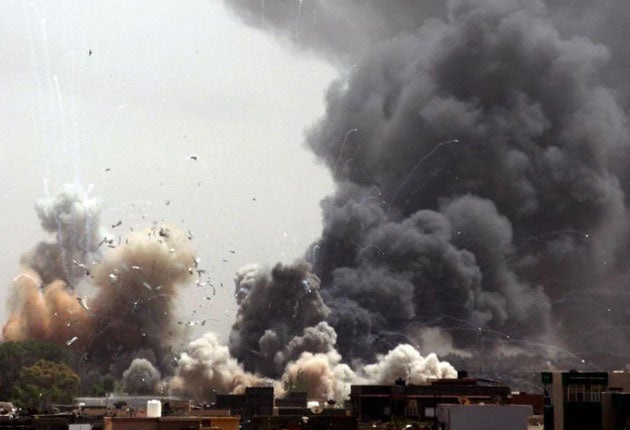Your support helps us to tell the story
This election is still a dead heat, according to most polls. In a fight with such wafer-thin margins, we need reporters on the ground talking to the people Trump and Harris are courting. Your support allows us to keep sending journalists to the story.
The Independent is trusted by 27 million Americans from across the entire political spectrum every month. Unlike many other quality news outlets, we choose not to lock you out of our reporting and analysis with paywalls. But quality journalism must still be paid for.
Help us keep bring these critical stories to light. Your support makes all the difference.
Low-flying Nato planes pounded Tripoli today in a series of 26 strikes that shook the Libyan capital in rare daytime raids designed to step up pressure on Muammar Gaddafi to leave power.
Some of the targets were believed to have been military barracks near Gaddafi's sprawling central Tripoli compound.
Nato has warned for days that it was increasing the scope and intensity of the two-month campaign to oust Gaddafi after more than 40 years in power.
A Gaddafi spokesman said the daylight strikes were particularly terrifying because families were separated during the day. Libyan school children are taking final exams at the end of the school year.
"Tens of thousands of children are in Tripoli. You can imagine the shock and horror of the children. You can imagine the horror of parents who can't check on their children who are far away," he said.
The strikes began at around 11.30am local time and continued through the day. Some landed in clusters of two and three booming explosions.
As Nato intensifies air attacks on Tripoli, there appears to be renewed diplomatic efforts to find a peaceful end to the civil war.
All efforts so far have failed, given that rebels are demanding Gaddafi leave power.
Meanwhile Tripoli sent Foreign Minister Abdul-Ati al-Obeidi to Beijing for a three days of talks, an apparent effort to restore some of Libyan government influence and defuse a setback delivered by China last week. Chinese officials announced on Friday that they had reached out to the rebel forces challenging Gaddafi, a significant effort to boost Chinese engagement in the Libya conflict and possibly jostle for a mediator role.
Beijing had stayed on the sidelines for the first few months since the revolt against Gaddafi's government erupted in mid-February, pointedly avoiding joining international calls for Gaddafi to step down and saying that was for the Libyan people to decide. China also abstained in the UN Security Council vote authorising the use of force against Libyan government loyalists and has repeatedly criticised the Nato bombing campaign in support of the rebels.
Subscribe to Independent Premium to bookmark this article
Want to bookmark your favourite articles and stories to read or reference later? Start your Independent Premium subscription today.

Join our commenting forum
Join thought-provoking conversations, follow other Independent readers and see their replies
Comments